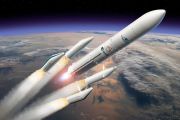
Copernical Team
SpaceX sends up satellites on 2nd launch attempt from Cape Canaveral
This request seems a bit unusual, so we need to confirm that you're human. Please press and hold the button until it turns completely green. Thank you for your cooperation!
Press and hold the button
If you believe this is an error, please contact our support team.
185.132.36.159 : 1964092f-f34e-4fc4-ab5d-f9c02c35
Video: Ignis Mission: Return to Earth
This request seems a bit unusual, so we need to confirm that you're human. Please press and hold the button until it turns completely green. Thank you for your cooperation!
Press and hold the button
If you believe this is an error, please contact our support team.
185.132.36.159 : 62b046cd-1cdc-40d8-8eb3-696ddf69
Surrey launches new Space Institute to drive mission-ready innovation and skills for UK space sector
 The University of Surrey has launched the Surrey Space Institute to address critical skill shortages and accelerate innovation in the UK's Pounds 19 billion space economy. The initiative aims to transform Surrey's 45-year legacy in small satellite development into practical, mission-ready technologies and solutions addressing global challenges like climate change, water security and space susta
The University of Surrey has launched the Surrey Space Institute to address critical skill shortages and accelerate innovation in the UK's Pounds 19 billion space economy. The initiative aims to transform Surrey's 45-year legacy in small satellite development into practical, mission-ready technologies and solutions addressing global challenges like climate change, water security and space susta Nuclear timekeeping may reveal hidden traits of dark matter
 For nearly a hundred years, scientists have sought dark matter, the unseen material believed to account for 80 percent of the universe's mass. Despite extensive efforts-including particle accelerator experiments and cosmic radiation searches-its properties remain largely unknown. Although dark matter doesn't interact directly with light, it may subtly influence visible matter, making it extremel
For nearly a hundred years, scientists have sought dark matter, the unseen material believed to account for 80 percent of the universe's mass. Despite extensive efforts-including particle accelerator experiments and cosmic radiation searches-its properties remain largely unknown. Although dark matter doesn't interact directly with light, it may subtly influence visible matter, making it extremel The secret life of neutrinos
 Neutrinos are cosmic tricksters, paradoxically hardly there but lethal to stars significantly more massive than the sun. These elementary particles come in three known "flavors": electron, muon and tau. Whatever the flavor, neutrinos are notoriously slippery, and much about their properties remains mysterious. It is almost impossible to collide neutrinos with each other in the lab, so it is not
Neutrinos are cosmic tricksters, paradoxically hardly there but lethal to stars significantly more massive than the sun. These elementary particles come in three known "flavors": electron, muon and tau. Whatever the flavor, neutrinos are notoriously slippery, and much about their properties remains mysterious. It is almost impossible to collide neutrinos with each other in the lab, so it is not ALLSPACE to Develop 5G NTN Satcom Integration with ESA Funding
 ALL.SPACE has secured euro 3.42 million from the European Space Agency (ESA) to accelerate its development of 5G Non-Terrestrial Network (NTN) integration. The award comes through ESA's Space for 5G/6G and Sustainable Connectivity programme under the Advanced Research in Telecommunications Systems (ARTES) framework, which promotes cutting-edge satcom innovation.
The funding will enable AL
ALL.SPACE has secured euro 3.42 million from the European Space Agency (ESA) to accelerate its development of 5G Non-Terrestrial Network (NTN) integration. The award comes through ESA's Space for 5G/6G and Sustainable Connectivity programme under the Advanced Research in Telecommunications Systems (ARTES) framework, which promotes cutting-edge satcom innovation.
The funding will enable AL Earth will spin faster marking 2nd shortest day in history
 Scientists predicted that Tuesday will be a fraction of a second shorter than the average day as the Earth's rotation is moving faster.
The international Earth Rotation and Reference System Service expects that Tuesday will be just 1.34 milliseconds shorter than the standard 24 hours.
"We've known about the rotation of the Earth being variable for about a hundred years," said the
Scientists predicted that Tuesday will be a fraction of a second shorter than the average day as the Earth's rotation is moving faster.
The international Earth Rotation and Reference System Service expects that Tuesday will be just 1.34 milliseconds shorter than the standard 24 hours.
"We've known about the rotation of the Earth being variable for about a hundred years," said the NASA's X-59 moves under its own power
 NASA's quest for a quieter supersonic jet passed an early test after its X-59 aircraft was able to taxi at low speed at a manufacturing plant in California.
The space agency on Tuesday announced the latest milestone for NASA's X-59 that is part of its Quesst mission to test the possibility of a supersonic aircraft with more muted sonic booms that will allow less noisy flights over popul
NASA's quest for a quieter supersonic jet passed an early test after its X-59 aircraft was able to taxi at low speed at a manufacturing plant in California.
The space agency on Tuesday announced the latest milestone for NASA's X-59 that is part of its Quesst mission to test the possibility of a supersonic aircraft with more muted sonic booms that will allow less noisy flights over popul York to Acquire Operations to Boost Ground Connectivity and Mission Delivery
 York Space Systems announced that its parent company has signed an agreement to acquire ATLAS Space Operations, a U.S.-based leader in Ground Software as a Service (GSaaS) for satellite communications. The acquisition aims to bolster York's ability to deliver integrated, mission-ready systems by incorporating ATLAS's software-driven ground architecture.
ATLAS will contribute to York's Gold
York Space Systems announced that its parent company has signed an agreement to acquire ATLAS Space Operations, a U.S.-based leader in Ground Software as a Service (GSaaS) for satellite communications. The acquisition aims to bolster York's ability to deliver integrated, mission-ready systems by incorporating ATLAS's software-driven ground architecture.
ATLAS will contribute to York's Gold 





























